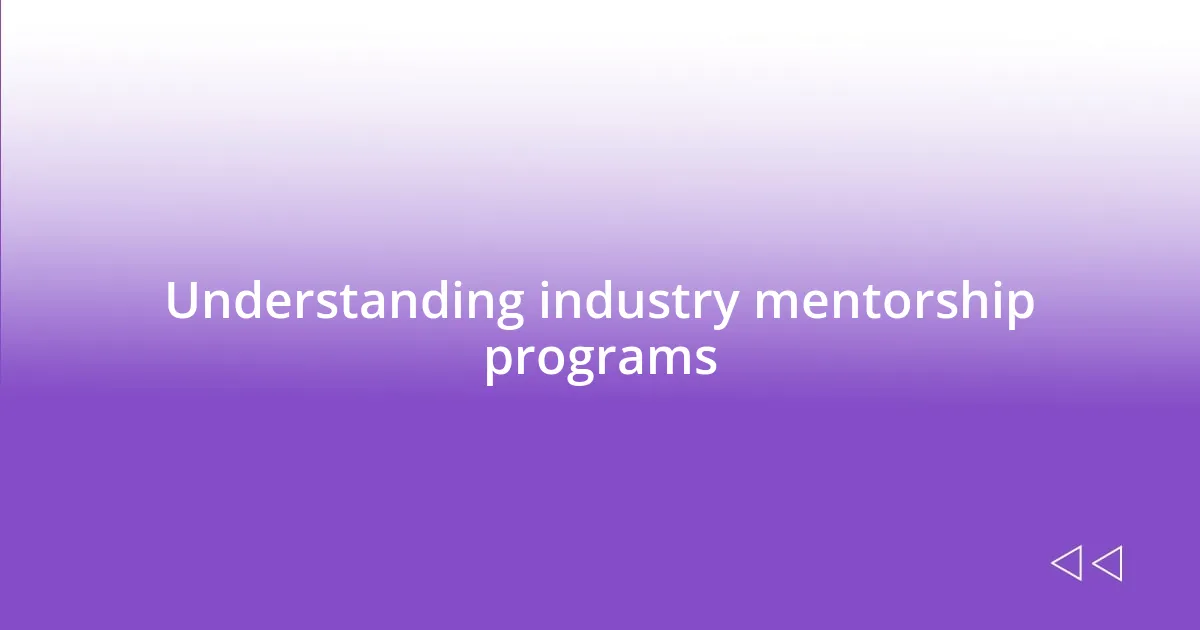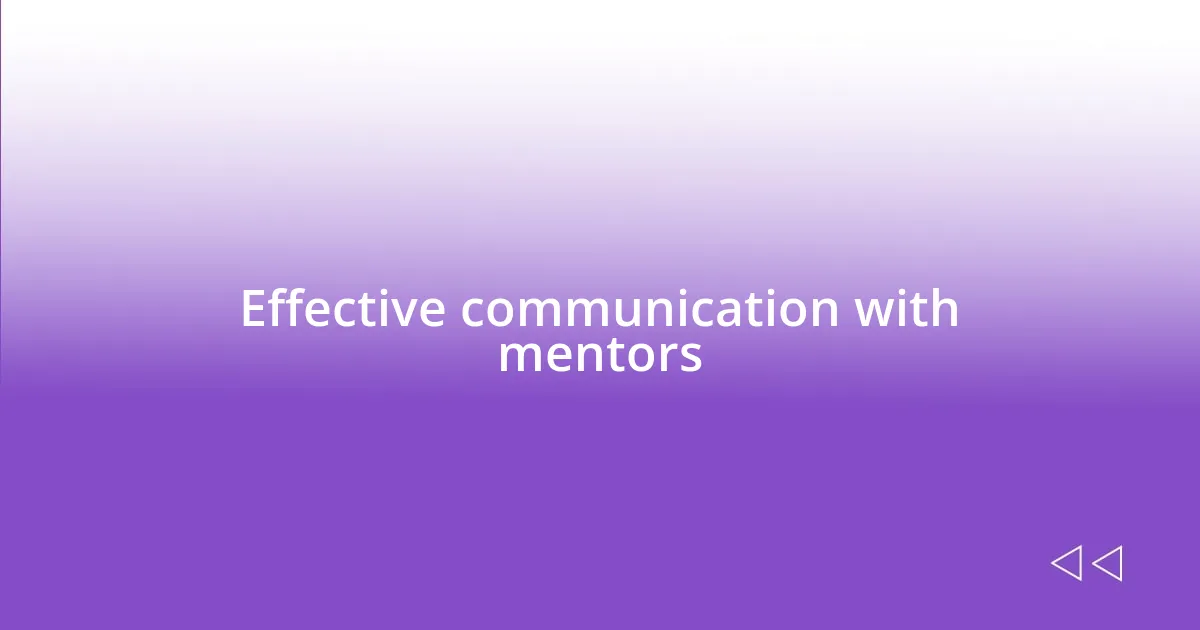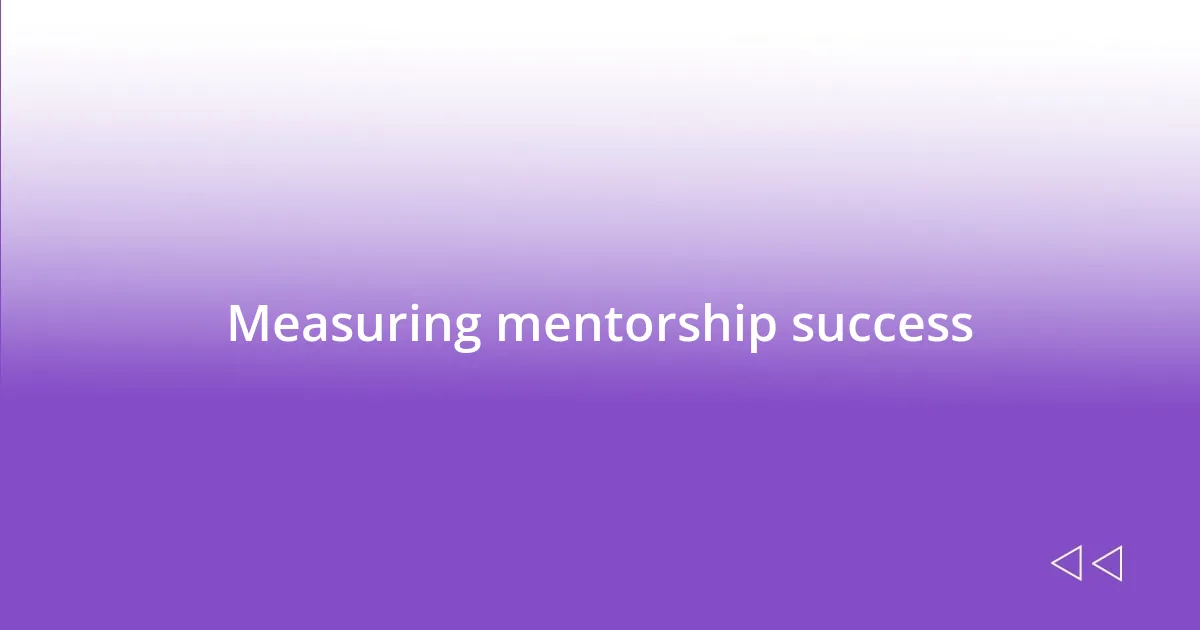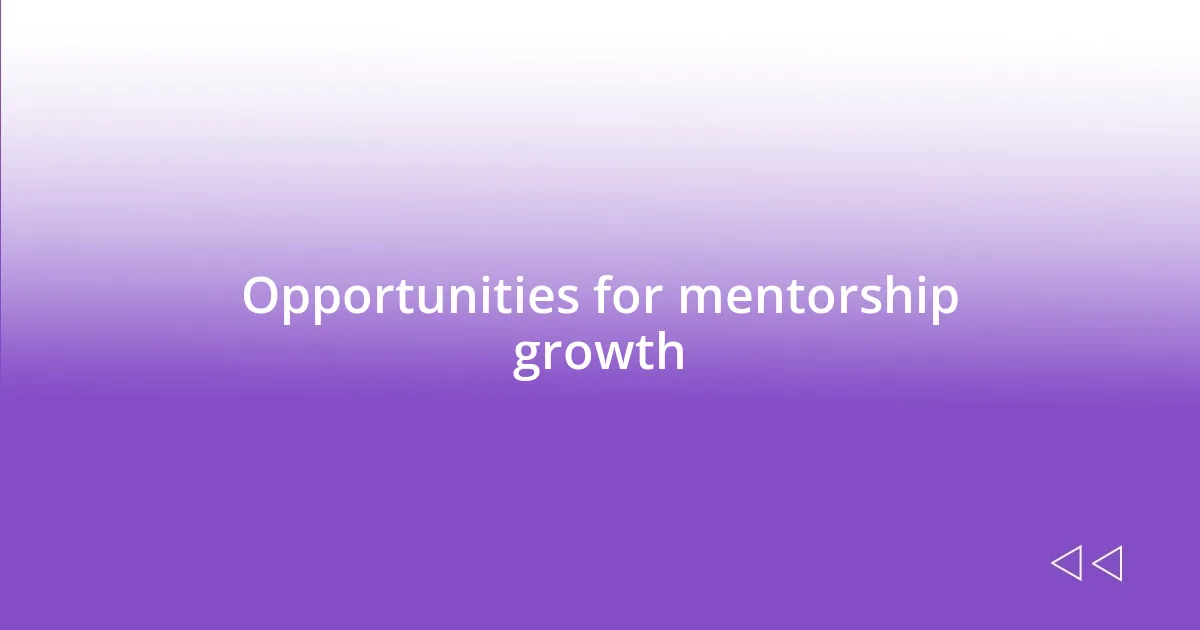Key takeaways:
- Industry mentorship programs offer vital guidance, emotional support, and networking opportunities that can greatly enhance personal and professional development.
- Finding the right mentor hinges on compatibility in communication styles, shared values, and a genuine commitment to mutual growth.
- Setting specific, adaptable goals and regularly reviewing them contributes to a more purposeful mentorship experience.
- Measuring mentorship success involves tracking achievements, gathering feedback, and reflecting on the growth journey to highlight progress.

Understanding industry mentorship programs
Industry mentorship programs serve as vital bridges between experienced professionals and those eager to learn. I remember my first interaction with a mentor; it was like having a compass in an uncharted territory. The guidance offered not only helped me navigate complex workplace dynamics but also instilled a sense of confidence that I didn’t know I had.
These programs often provide structured frameworks that align mentors and mentees with similar backgrounds or goals, fostering meaningful connections. Isn’t it fascinating how a seasoned professional can offer insights that transform your perspective? I learned to appreciate the balance of vulnerability and courage in these relationships, allowing for genuine exchanges that can spark incredible growth.
Moreover, the emotional support that comes from having someone invested in your development is truly invaluable. Reflecting on my journey, I often wonder how different my path would have been without that mentoring experience. Each conversation became a stepping stone, pushing me to aspire for more than what I initially thought possible.

Benefits of industry mentorship
The benefits of industry mentorship are vast and transformative. Personally, I can’t emphasize enough how a mentor can open doors that you didn’t even know existed. I still recall when my mentor introduced me to a network of professionals in my field, a connection that not only advanced my career but also enriched my understanding of industry standards and practices. These relationships can provide clarity in navigating challenges and offer fresh perspectives that encourage innovative thinking.
Here are some specific benefits of industry mentorship:
– Guidance in Decision-Making: Having a mentor helps in evaluating choices and making informed decisions.
– Skill Development: They often provide targeted feedback that sharpens your skills and increases your confidence.
– Networking Opportunities: Mentors expand your professional network, connecting you with peers and industry leaders.
– Emotional Support: Knowing you have someone who believes in your potential can significantly boost your morale.
– Accountability: A mentor holds you accountable for your goals, pushing you to achieve them.
Reflecting on my own experiences, that sense of accountability made all the difference; it motivated me to stay focused and passionate about my work. The dynamic is not just about learning—it’s a mutual growth journey that can lead to heightened enthusiasm and success in your professional life.

Finding the right mentor
Finding the right mentor can feel daunting, especially when the stakes are high for your career. I remember when I started searching for a mentor; it felt like dating without the romance. I realized that personality compatibility played a significant role in this journey. A mentor’s communication style and values should resonate with yours. After connecting with someone whose background aligned with my aspirations, I found a mentor who challenged my thinking and supported my growth in ways I never anticipated.
In my experience, the right mentor isn’t just about expertise; it’s about chemistry. I had a mentor whose approach to feedback was refreshingly candid. This honesty trimmed the fluff, allowing me to focus on what truly mattered. Think about it—wouldn’t you prefer someone who will give you a nudge when you need it rather than simply patting you on the back? I learned that an ideal mentor should not only have relevant experience but also offer a safe space for open dialogue.
Choosing a mentor should also involve understanding their commitment level. I had a mentor once who promised the world but struggled with time management, often leaving me feeling abandoned. So, keep in mind that time availability and a genuine interest in your success are crucial. You want someone who shows up consistently, ready to invest time in your development. Through these experiences, I understand that finding the right mentor is both an art and a science that requires patience and intention.
| Considerations | Ideal Mentor Characteristics |
|---|---|
| Communication Style | Open, honest, and relatable |
| Shared Values | Alignment in ethics and professional goals |
| Experience | Relevant and demonstrates real-world success |
| Time Commitment | Willingness to invest time and energy |

Effective communication with mentors
Effective communication with mentors is the cornerstone of a successful mentorship experience. I vividly remember the first time I met my mentor; I was nervous but excited. During our conversation, I learned that asking open-ended questions can lead to deeper insights. For instance, instead of simply asking, “What should I do next?” I started to phrase it as, “What strategies have worked for you in similar situations?” This shift opened up meaningful discussions and allowed me to gain valuable perspectives.
In my journey, I’ve found that active listening is just as crucial as speaking. I realized that when I focused on truly understanding my mentor’s advice rather than just waiting for my turn to respond, the conversations became much more enriching. Have you ever noticed how a simple nod or a follow-up question can strengthen the connection? It shows that you value their input and encourages them to elaborate, leading to a richer exchange of ideas.
Moreover, I believe that expressing appreciation plays a significant role in effective communication. After receiving guidance, I would often send a quick note of thanks, acknowledging how their insights impacted my decision-making. This small gesture not only solidified our relationship but also made my mentor feel valued in their role. It’s about creating an environment where both parties feel heard and respected, fostering a more productive mentorship experience.

Setting goals in mentorship
Setting goals is an integral part of the mentorship journey. In my experience, articulating specific, measurable goals can steer the mentorship in a meaningful direction. For instance, rather than saying, “I want to improve my skills,” I would frame it as, “I want to develop my public speaking skills by the end of the quarter.” This clarity transformed the discussions with my mentor into actionable plans, making each meeting feel purposeful and rewarding.
Moreover, I’ve learned that staying flexible with your goals can be just as important. I remember setting a target for networking opportunities, but as I engaged in the process, it became evident that my real need was to work on my confidence during conversations. Shifting gears didn’t feel like a setback; instead, it opened new avenues for growth. How often do we realize that the path we envisioned isn’t the one we need? Embracing adaptability in goal-setting can lead to richer mentorship experiences.
Finally, I believe that it’s vital to revisit goals regularly throughout the mentoring relationship. During one of my check-ins, my mentor and I reviewed my progress. There were moments of both pride and surprise as we uncovered achievements I hadn’t initially recognized. Reflecting on our goals kept me motivated and engaged, reminding me of how far I’d come, while also revealing areas that called for more focus. Have you ever found that taking a moment to step back provides clarity? It truly can be a game-changer in both personal and professional growth.

Measuring mentorship success
Measuring mentorship success is a nuanced endeavor. I often reflect on milestones that truly encapsulate progress. For instance, after six months of meetings with my mentor, I was able to present in front of a large audience, an achievement I hadn’t thought possible before. How do we quantify moments like that? Perhaps it’s through our narratives of growth, as they highlight the journey we’ve embarked upon together.
Another important aspect is gathering feedback from both mentors and mentees. I remember implementing a simple survey after a mentoring cycle. It was eye-opening to hear my mentor’s perspective on our interactions; I discovered areas I could improve in communicating my challenges. Did I expect such candid thoughts? Not entirely. But realizing our conversations were valued, even beyond our time together, deepened my appreciation for the mentorship dynamic. It’s fascinating how a little feedback can spark transformative insights.
Lastly, I find that tracking achievements against the set goals can reveal a lot about the mentorship experience. As a mentee, I kept a journal where I logged successes and challenges. Looking back, I felt a swell of pride as I saw how many goals I had surpassed. Have you ever looked back at your journey and found unexpected treasures? This practice not only helped me celebrate small wins but also served as a reminder of the support I received, illuminating the tangible impact of mentorship in my life.

Opportunities for mentorship growth
Opportunities for mentorship growth often present themselves in unexpected ways. I’ll never forget a chance encounter at a local industry conference where I bumped into someone my mentor had mentioned in passing. This wasn’t just a networking opportunity; it was a pivotal moment that shaped my understanding of my field. Have you ever been surprised by how a single interaction can open up a world of possibilities? That conversation led to ongoing collaboration and learning, proving that mentorship goes beyond scheduled meetings.
Moreover, leveraging diverse perspectives can amplify growth in mentorship. By connecting not just with my mentor, but also with their network, I have been able to explore new avenues that I hadn’t considered. I distinctly recall a coffee chat with one of my mentor’s former mentees. Their insights on navigating career transitions were invaluable, shedding light on challenges I had yet to face. Isn’t it fascinating how sharing experiences can create a ripple effect of learning? It feels like discovering hidden treasures in a familiar landscape, expanding my knowledge and skills in ways I couldn’t anticipate.
Lastly, embracing failure as part of the growth process can transform your mentorship journey. I once approached a significant project with overwhelming confidence, only to face unexpected challenges that made me rethink my strategy. Instead of viewing this as a setback, I turned to my mentor, who helped me unpack the experience and extract valuable lessons. Can you recall a time when a failure turned into a stepping stone for personal growth? That reflection opened up discussions about resilience and creativity, ultimately making our meetings richer and more impactful.














